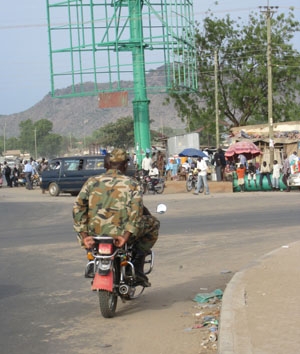Professor Chris Blattman had a thought-provoking post on his blog last week titled “The State in Africa: Ignored.” Here’s a clip:
In Liberia, if you need a policeman you must pay him to come to you, since he has no transport. There may only be one or two policeman for an entire district. They get paid at roughly the poverty line, and may not have been trained.
The same phenomenon can be seen here in Juba, the capital of southern Sudan. On a recent morning, I was headed to a bustling market on a boda (motorcycle taxi) when I spotted a fellow commuter, a soldier in the southern Sudanese army, in front of me and snapped this photo:

It is a common sight in Juba to see members of southern Sudan’s armed forces taking taxis or hitching rides (later in the morning I saw three large men, dressed in Southern Sudan Wildlife Service uniforms, crammed on one bike). Professor Blattman’s description of a vehicle-less policeman usefully illustrates the larger problems behind Liberia’s lackluster security forces, and these same security sector challenges are evident in South Sudan. The same phenomenon of underpaid, poorly resourced armed forces exists in southern Sudan, despite the fact that 25 percent of the annual budget of the Government of Southern Sudan is allocated to the southern army, or SPLA, another 9 percent to internal affairs (namely the police and prison services), and 3 percent to the Wildlife Services (another branch of the organized forces), according to a draft 2010 GoSS budget viewed by Enough.
With little training and resources, it is frankly no wonder that the police are feared by locals (and internationals like me) and known for abusing their power to bum rides from people with cars or motorcycles, or worse.

